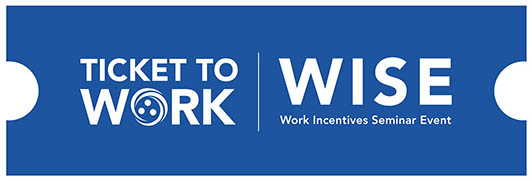You Asked, We Answer! Ticket to Work for Young Adults
 During our June WISE webinar, Ticket to Work for Young Adults, guest presenter Tad Asbury of the Bridges from School to Work (Bridges) program, gave employment advice for people with disabilities, specifically young adults. As young adults with disabilities leave school and transition to the workforce, the Bridges and Ticket to Work (Ticket) programs offer supports and resources for finding work.
During our June WISE webinar, Ticket to Work for Young Adults, guest presenter Tad Asbury of the Bridges from School to Work (Bridges) program, gave employment advice for people with disabilities, specifically young adults. As young adults with disabilities leave school and transition to the workforce, the Bridges and Ticket to Work (Ticket) programs offer supports and resources for finding work.
More than 300 attendees learned how Bridges, the Ticket program and Social Security's Work Incentives may help young adults and people with disabilities find their paths to careers and financial independence. We were excited to see that many people had questions about resources they could use, and today we're sharing answers to the top questions from the webinar.
What is the Bridges from School to Work program?
The Marriott Foundation for People with Disabilities established the Bridges from School to Work (Bridges) program in 1989 to help businesses meet workforce needs by pairing them with qualified entry-level employees. Bridges is an Employment Network (EN) under the Ticket program. Each year, Bridges helps more than 1,000 young adults prepare for the workplace and find a job. Most of the young adults it serves are transitioning out of high school special education programs, and Bridges provides options and supports to meet their work goals.
Bridges is employer-driven. They focus on the abilities and skills that people with disabilities have and match them with jobs for which they are well-qualified. A thoughtful job match, employment supports and additional resources can help many people with disabilities achieve success.
Bridges helps both the employer and employee build trust and respect as they strive to meet employment goals.
What is PASS? How can it help young adults with their career goals?
The Plan to Achieve Self-Support (PASS) is a Work Incentive that can help many people with disabilities, including young adults, as they work toward their employment goals. PASS is available to people who receive Supplemental Security Income (SSI) or can become eligible for it. If you apply for a PASS and Social Security approves it, you can set aside income (other than SSI) to pay for a specific work-related item or service, such as education, self-employment start-up costs, job coaching or transportation. When Social Security figures your SSI payment, they do not count the income you set aside under your PASS. This means Social Security will continue to provide benefits for basic living needs and you can save money to meet your work goals. You can learn more about PASS in Work Incentives Wednesdays: Plan to Achieve Self-Support.
Be ready to provide examples of your work experience:
|
What can I do to prepare for and feel confident during a job interview?
As Tad explained during the webinar, it's not what you know, but what you DO with what you know that matters. The STAR method of answering questions during an interview can help you to feel confident about sharing what you know to increase your chance of being hired. The STAR method involves:
- Situation: Think about a situation that had a successful outcome.
- Task: Describe the task you were responsible for in the situation.
- Action: Describe exactly what you did.
- Result: Share the outcome and how you contributed to it.
Many employers conduct pre-hire tests by asking about prior work experience, believing that past performance is the best predictor of future performance. Companies want individuals whose skills, abilities and character stand out. Before your next interview, think about and prepare concrete STAR examples to show that your experience and skills are perfect for the job.
Ticket to Work
Social Security's Ticket to Work (Ticket) program supports career development for people ages 18 through 64 who receive Social Security disability benefits (SSI or SSDI) and want to work.
The Ticket program is free and voluntary. It helps people with disabilities move toward financial independence and connects them with the services and support they need to succeed in the workforce.
The Ticket program can also share information about Work Incentives, which may help you transition to work. You don't need to worry about suddenly being without your benefit payments and Medicaid or Medicare because you started working. For more information about all of Social Security's Work Incentives, check out The Red Book – A Guide to Work Incentives.
National WISE webinars
Each month, Social Security's WISE webinars share resources and tips for people with disabilities to help them find work and financial success. WISE webinars can help you stay informed about Ticket program information, new and existing resources that may help as you consider work and learn more about specific employment topics. Our next WISE webinar, Ticket to Work and Reasonable Accommodations, will take place on Wednesday, July 19, 2017, 3-4:30 p.m. ET. Register today!
Learn more
To learn more about the Ticket program, visit www.ssa.gov/work. You can also call the Ticket to Work Help Line at 866-968-7842 or 866-833-2967 (TTY) Monday through Friday, 8 a.m. to 8 p.m. ET. Ask a representative to send you a list of service providers or find providers on your own with the Ticket program Find Help tool.